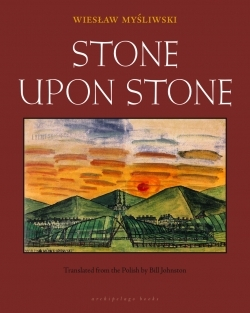Stone Upon Stone
“All the evil in the world is from envy,” says Szymek, the hero of Wiesław Mykśliwski’s novel Stone Upon Stone. “If you look around the world you see mountains envying each other, and rivers, small things envying big ones, even one apple on the apple tree envying another apple.” Embittered and alone after the German invasion of Poland, Szymek has plenty to envy. His neighbors, despite the ravages of war, seem to have better crops and more cows. Their headstones are magnificent, whereas the Szymeks are buried in the ground, where “the earth can work them over.” In the topsy-turvy decade of rebuilding, it seems that nobody is getting his just desserts. Szymek, seeking to make his mark on the future—and dignify his family’s past—begins to build a magnificent tomb in the village cemetery, with room to bury his parents, his brothers and their wives, and finally himself.
The no-nonsense, stark prose of Stone Upon Stone is beautifully preserved in Bill Johnston’s translation. The sentences are clear and spare, stacked neatly by a master bricklayer. This is Mykśliwski’s first novel in English translation, originally published in 1999, after Poland’s first free parliamentary election returned power to former Communist leaders and the economy faltered. Through Stone Upon Stone, Mykśliwski examines Poland’s political past as well as its 1999 upheaval. Szymek’s village is a microcosm for the violence and unrest ravaging the country—Szymek gives detailed accounts of each family, his parents’ and grandparents’ histories, and his own involvement in the Polish resistance. The peasants, Mykśliwski shows, bear the real weight of war. “God ought to be like a person, so you can see that whatever’s painful for people is painful for him as well,” Szymek says. “So you can be troubled when he’s troubled. Give me your cross, I’ll carry it for you, and you do some of my thinking for me.”
With a keen eye on Poland’s history as well as its troubled present, Stone Upon Stone is Mykśliwski’s monument to his country, just as Szymek’s tomb is a monument to his ruined family. With clear, compelling details of farming life in rural Poland, Mykśliwski draws the reader into a world that is both shattered and whole, growing and dying, hopeful and already lost. Readers who enjoyed Everything is Illuminated, Homo Zapiens, or The History of Love will revel in this beautiful portrait of a country, this swan song for a way of life as it fades into the past.
Reviewed by
Claire Rudy Foster
Disclosure: This article is not an endorsement, but a review. The publisher of this book provided free copies of the book to have their book reviewed by a professional reviewer. No fee was paid by the publisher for this review. Foreword Reviews only recommends books that we love. Foreword Magazine, Inc. is disclosing this in accordance with the Federal Trade Commission’s 16 CFR, Part 255.

